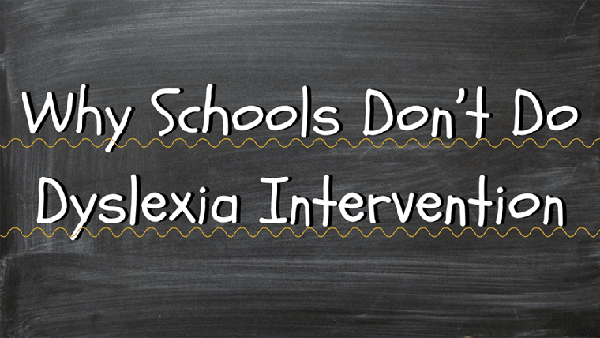Why Schools Don’t Do Dyslexia Intervention
Written by Marie Lunney
Published on October 25, 2016
 Unfortunately, the public school system often denies and delays any identification or treatment for dyslexic students. In this post, we will explore the reasons why dyslexia intervention traditionally doesn’t exist in school. Although it is important to advocate for your child’s rights in school, we urge you to get your child’s intervention outside of the school to prevent them from falling further behind.
Unfortunately, the public school system often denies and delays any identification or treatment for dyslexic students. In this post, we will explore the reasons why dyslexia intervention traditionally doesn’t exist in school. Although it is important to advocate for your child’s rights in school, we urge you to get your child’s intervention outside of the school to prevent them from falling further behind.
3 Reasons Why Schools Don’t Do Dyslexia Intervention
1 – Teachers often aren’t taught to recognize dyslexia symptoms.
Many good teachers fail to recognize dyslexia symptoms in their students. Teacher education programs (especially in elementary education) do not prepare teachers to recognize dyslexia, let alone teach students with dyslexia. The challenge begins with elementary teachers who, charged with recognizing and acting on early symptoms, become gatekeepers of the initial diagnosis. As a result, many children with dyslexia go undetected until they fall further and further behind in later grades. Without identification, actions are not made to create dyslexia intervention programs.
2 – Lack of funding and resources makes it difficult to provide dyslexia-specific testing and intervention.
Public schools are already working on tight budgets. It seems that every year there are budget cuts and tough decisions to be made on allocating funds. Not only are public schools lacking funding but they are often lacking time and teachers as well. Providing dyslexia-specific testing requires expensive tests, and hiring or training of an evaluator. Beyond testing, dyslexia intervention requires the time of a specialist, again, a costly endeavor. Current learning disability testing in schools does not test for dyslexia and the reading intervention programs in place are unsuccessful for a child with dyslexia. However, this is what the school has and any changes require resources that many schools don’t have.
3- The Structured Literacy method isn’t conducive for group settings.
 The word “school” implies a group. Sometimes being part of a group facilitates learning and sometimes it doesn’t. Dyslexic children don’t have the luxury of time. They need to attain functional reading and spelling as fast as possible. The longer that is delayed the farther behind they fall academically.
The word “school” implies a group. Sometimes being part of a group facilitates learning and sometimes it doesn’t. Dyslexic children don’t have the luxury of time. They need to attain functional reading and spelling as fast as possible. The longer that is delayed the farther behind they fall academically.
Teaching reading and spelling skills to a group of dyslexic students is a bit like teaching a group piano lesson. Some students may master the practice piece in a week. Others may take four weeks. If the piano teacher paces instruction for the more advanced students in the group the less advanced students won’t be ready for the recital. If the instruction is designed and paced for the less advanced students the more advanced students will be bored and will lose interest.
In structured literacy therapy, it is essential that the child master each level before moving on to the next level. If mastery and fluency aren’t achieved at each level the child will keep tripping on words. Regardless of what structured literacy method is used, it is virtually impossible to have all the children in any group ready to move from level to level at the same time. Someone will always be way ahead and someone will always be way behind. One-on-one, individualized intervention is almost never an option in the public school system, but it is necessary for a dyslexic student.
Helping Your Dyslexic Child
Research indicates that early intervention is key to your child’s success. If your child isn’t getting the help they need in school or the services they are getting aren’t yielding the results you would expect, please consider outside help. Lexercise guarantees to improve your child’s reading by one grade level in two months of therapy or your third month is on us!
Improve Your Child’s Reading
Learn more about Lexercise today.
Schedule a FREE
15-minute consultation



